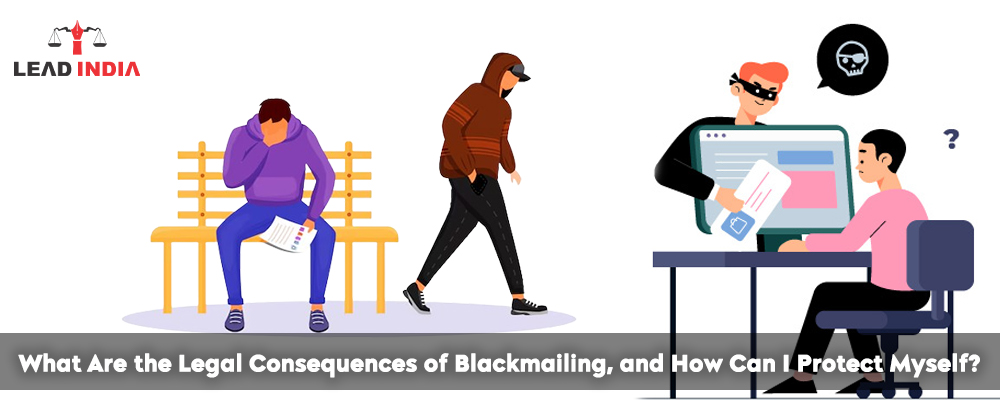Blackmail amounts to breaking the law and every person’s rights and dignities are at risk. It means pressuring and threatening a person over leakage or damage to their integrity or even making any other threats unless certain conditions are fulfill. In the country of India, the law against blackmailing is very strong and paves ways for the aggrieved persons to seek justice and protection victims are able to find.
Blackmail: About
- Indian law does not have an express provision defining blackmail. However, several sections of the Bhartiya Nyaya Sanhita (BNS) deal with blackmail and all its elements.
- To put it briefly, blackmail is a type of criminal intimidation, emotional abuse, and extortion.
- Usually, this includes making threats in order to obtain money or property or to compel someone to do something against their wishes.
- The threats may involve revealing personal information, inflicting harm on relatives, or even making false charges.
Need A Legal Advice
The internet is not a lawyer and neither are you. Talk to a real lawyer about your legal issue

Legal Provisions in India for Blackmail
Section 308 (2): Punishment for Extortion
Extortion is define in law as the illegal obtaining of money, property, or any valuable security from a person with their consent through harassment or any other form of threat. In case of conviction, the criminal shall be liable to imprisonment of not more than seven years and also to a fine.
Section 351 (1): Criminal Intimidation
Criminal intimidation is an act of threatening to cause undue harm to a person in terms of body, fame, or assets of their own or another person. If such intimidation is direct at achieving something, it is known as blackmail.
Section 351 (2): Punishment for Criminal Intimidation
In case of conviction, the accused is liable to face imprisonment for a term of up to seven years or a fine or both, depending on how serious the threats are.
Section 351 (4): Criminal Intimidation by Anonymous Communication
This section extends the scope of all such threats made indirectly or anonymously, which is punishable with imprisonment for a term not exceeding two years in addition to those under section 506 of IPC
Section 308 (6): Putting a Person in Fear of Accusation
This section also provides for punishment for threatening to report the victim to the authorities in order to gain unreasonable advantage over him. The penalties may include imprisonment for a term of not less than seven years but may extend to life imprisonment as well as a fine.
The Information Technology Act, 2000
In the event of online blackmail (for example, through social media, email, use of computers, or network systems), the provisions of the IT Act come into play:
- Section 66E: Penalizes taking and sharing private photos without the proper authorization.
- Section 67: Prohibits publication of obscene material in electronic form with terms including imprisonment and fines.
Legal Consequences of Blackmailing
The punishment given to blackmailers is subject to the type and seriousness of the crime committed:
- Imprisonment: A sentence of two to life in prison.
- Fines: Large fines that are separate from the prison term may be impose.
- Forfeiture: In situations where extortion or fraudulent transactions are commit, the judge may order the forfeiture of the properties acquire.
In addition, a third or more offences and offences with more serious consequences may attract higher sanctions.
Ways for Protecting Yourself from Blackmail
- Recognize the Threat: Keep an eye on common patterns of manipulation. In case of unreasonable requests, where inferring threats are present, it is important that you take this seriously.
- Be Silent: Do not enter into any negotiations or give in to the demands of the person trying to blackmail you. After all, most of the times, compliance with someone’s threats leads to even greater manipulations.
- Secure Information: Make sure to obtain proof of every incident of blackmail. Details may include but are not limit to text message screenshots, email screenshots, any voice recording or any other form of communication.
- Inform the authorities in charge: Proceed to make an official statement in the closest police station. In the case of blackmail that is being perpetrate online, attempt to reach the Cyber Crime Cell either via their website or help center.
- Seek Legal Advice from a Professional: Approach an Attorney who specializes in cyber or criminal law. They can assist you with the appropriate processes concerning the lodging of an FIR and ensure that the right legal processes are follow.
- Utilize Technology: Implement measures to enhance security when speaking via communications channels like telephony networks, voice-over internet protocol services and the internet. Do not disclose any confidential communication on open systems.
- Support Networks Availability: Let reconcilable relatives or close friends be inform. It is advisable to have such a network to minimize psychological strain and to deal with the threats at hand.
- Involve the Authorities: In the most extreme of situations, courts may issue restraining orders or even order protective services from law enforcement.
One can talk to a lawyer from Lead India for any kind of legal support. In India, free legal advice online can be obtain at Lead India. Along with receiving free legal advice online, one can also ask questions to the experts online free through Lead India.





 Talk to a Lawyer
Talk to a Lawyer